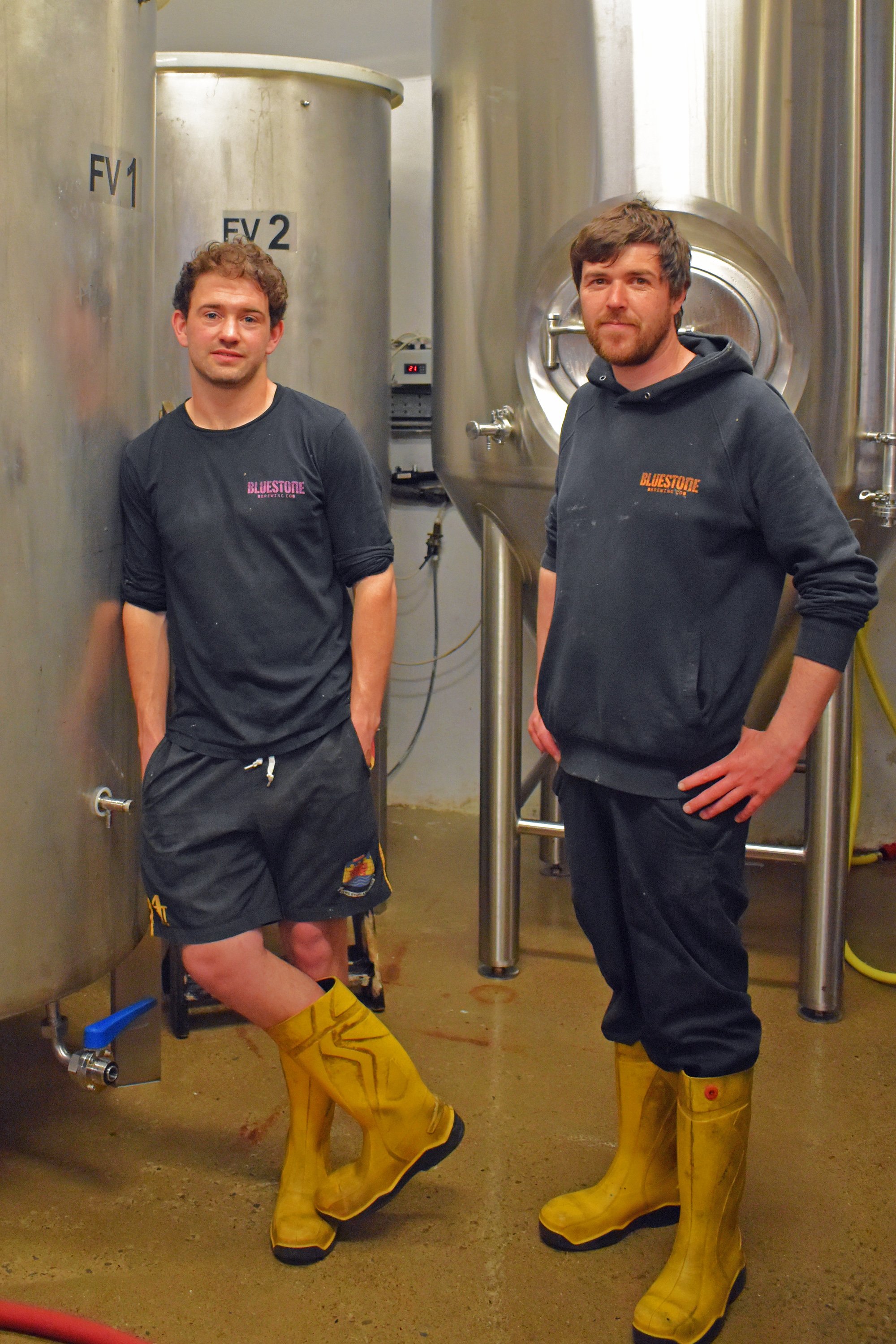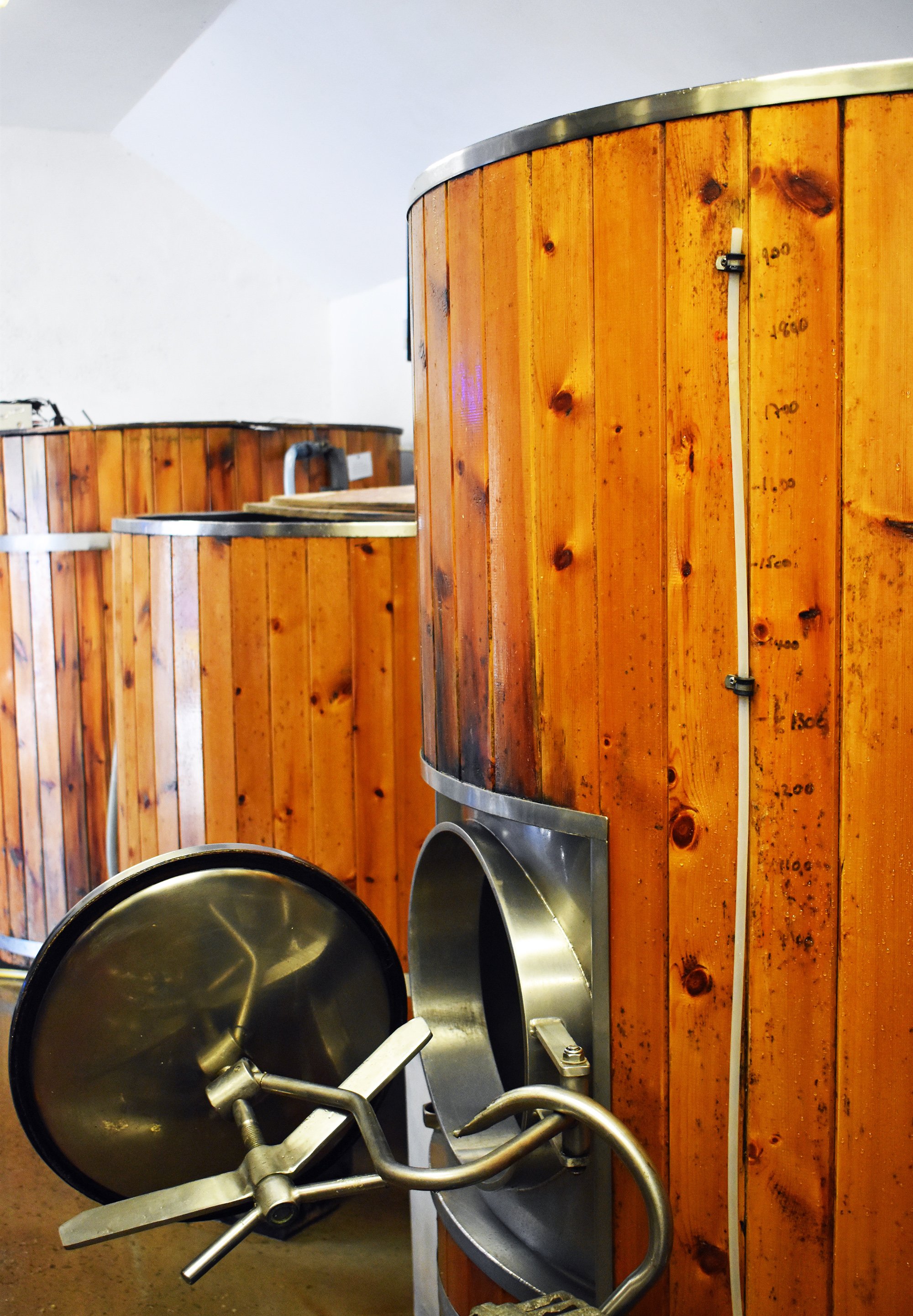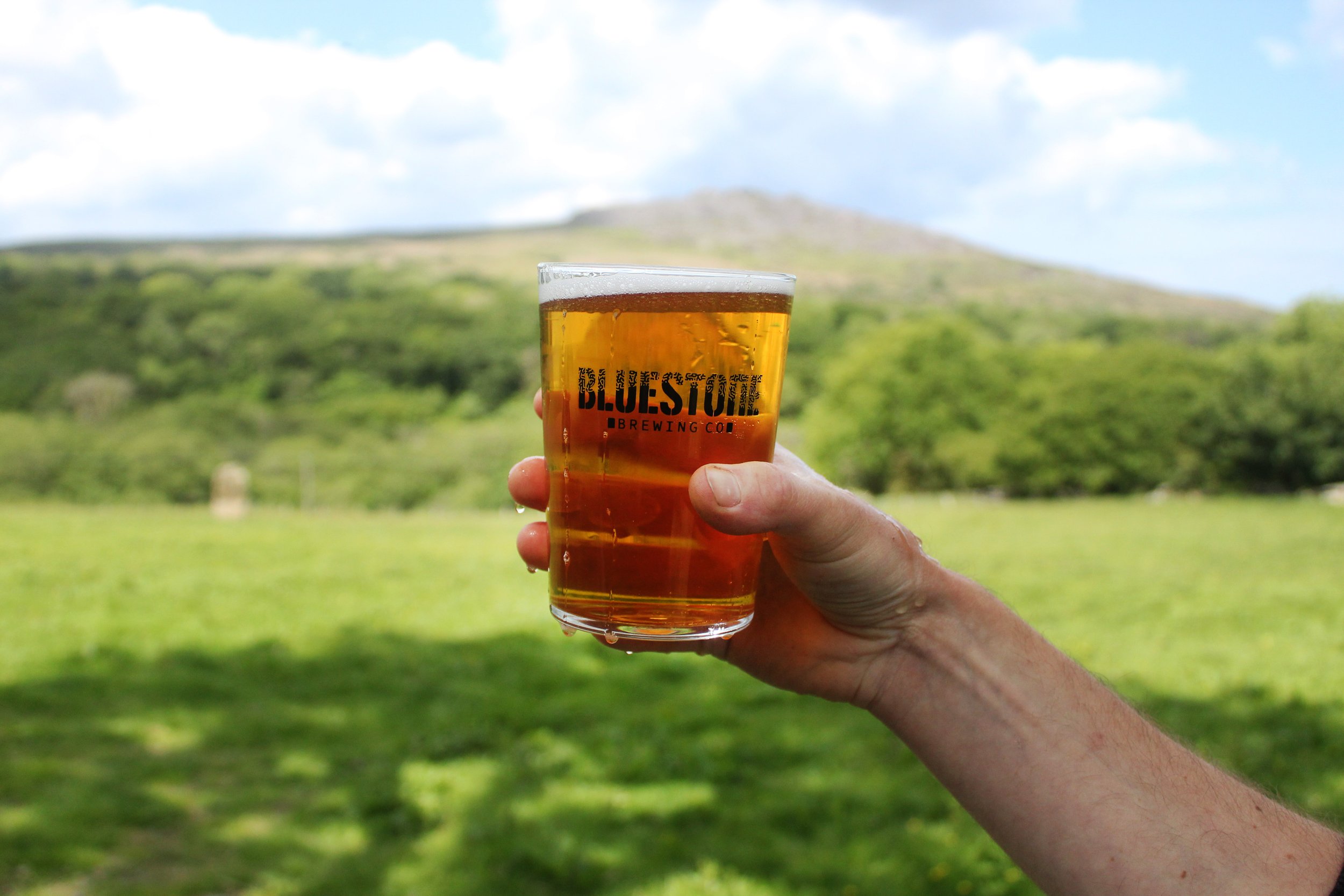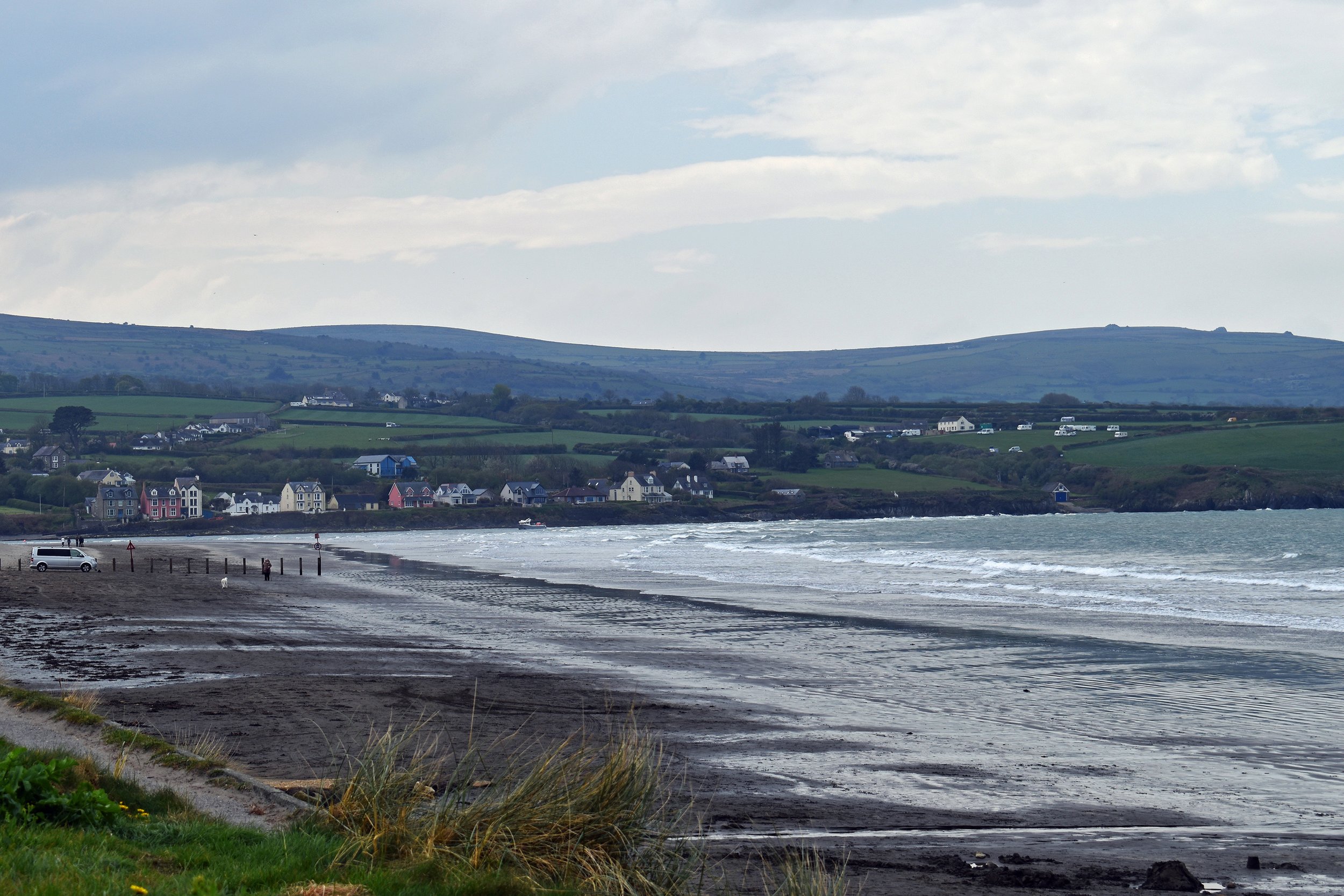The Hills Are Alive — Meeting the Founders of Bluestone Brewing Company in Cilgwyn, Wales
It’s unlikely there are many breweries in the UK set in a more idyllic, rural location than Bluestone Brewing Company, in the Pembrokeshire Coast National Park. Established in 2013, the brewery is based at Tyriet, a working farm in the Welsh hamlet of Cilgwyn. Located three miles from Newport beach, along narrow, high-hedged lanes, it lies in the shadow of brooding Carn Ingli, a thousand-foot, craggy mountain that dominates the local landscape.
Photography by Mike Clarke, with additional images by Kate Dunwell and Emily Hutchinson
Carn Ingli is part of the Preseli range, renowned for its bluestone. The brewery is named after this type of mineral (dolorate) which appears to have possessed sacred significance since the Neolithic era. Many huge pieces of quarried bluestone were famously transported from Pembrokeshire to Stonehenge. In fact, it’s conceivable that the local groundwater used by the brewery has been percolating through the rocks since the stone circle’s sarsens were quarried back in the stone age.
Situated in an unspoilt, rustic environment, the brewery has embraced a philosophy of sustainability and environmental awareness from the outset. It became the first brewery in the world to achieve Green Key accreditation and is currently applying for B-Corp certification for its social and environmental practices. The brewery also won the Best Sustainable Tourism award at the Pembrokeshire Tourism Awards in 2019.
Tourism is a mainstay of the local economy but there’s also a more permanent local community, who value the area’s unspoiled environment and growing reputation for green living and eco-friendly initiatives.
The brewery has expanded over the last few years to its current sixteen hectolitre capacity and now has a team of eight empolyees. Its wide range of beers, packaged in both keg and cask, as well as bottle and can, can be found predominantly in pubs in the local Pembrokeshire area. It expanded in other ways too—during the Covid lockdowns of 2020 and 2021, they opened Grain, a pizza restaurant in the town of St. David’s, about twenty miles west, in a joint venture with The Canteen, a local Newport restaurant.
The lighter beers, such as Hammerstone IPA and Bedrock Blonde are more often found on draught, reflecting the seasonal tastes of visitors to the area. On my visit to the Castle Hotel in Newport, their golden session ale, Stone Cold, provided perfect refreshment after a steep cliff top walk. At the Golden Lion in Newport (the brewery’s “unofficial” taproom) I enjoyed one of Bluestone’s more unusual brews, Mandarina Bavaria, the first of a single hop series which showcased the German varieties orange citrus notes.
But does brewing in a beautiful, remote rural environment have any tangible impact on the way the brewery and its staff work? And how does this influence its beers?
In keeping with the theme of environmentally friendliness, I hiked the three miles from Newport through woods carpeted with bluebells, alongside sparkling mountain streams and across heathery moorland trails to visit the Bluestone Brewing Co tap where I met marketing director Emily Hutchinson, Founder and managing director Simon Turner, and head brewer Tomos Dunn.
***
Mike Clarke: Why did you decide to open a brewery?
Simon Turner: Me and my wife Kerry were farming the land but I also had another business, which was water pump engineering. It took me all over the world to work on irrigation for golf clubs and similar things. I began to look for a business I could work on closer to home and I realised I could start a brewery actually at home. We had the farm, which Kerry has continued farming, but had also wanted to diversify and there was some overlap in engineering terms with my previous business.
MC: Is that what attracted you to brewing?
ST: No. I enjoyed beer as a drinker but I happened to be a very good friend of Tony Gartland from Saltaire Brewery, who suggested we had the perfect set-up here. We had the buildings and the space and, importantly, our own water source. So, Kerry, myself and my daughter Amy took the plunge in 2013, later bringing Emily and Tom on board in 2016.
MC: What brought you to this quiet corner of Wales?
Emily Hutchinson: Tom and I are a couple. He’s from Caerphilly. I'm originally from Nottingham. We met at Swansea University, did some travelling afterwards and got very interested in craft beer in places we visited, like Australia. Then we were both working in a pub for the summer in another part of Pembrokeshire. We got frustrated that they weren’t selling local beers when there was a fantastic opportunity to get a local craft beer scene going. Rural Wales was a little behind the exciting craft beer developments in the cities, although nowadays it’s catching up and there’s breweries like Wild Horse up in North Wales doing amazing things.
Tomos Dunn: I’m a chemical engineering graduate, which I knew could lend itself well to brewing and we heard about a new brewery that had opened in Pembrokeshire. I got in touch with Simon and basically just turned up asking “Can I brew with you for a day? Can I find out a bit more about how it all works?”
MC: How does being located on a very rural farm influence the brewery, or even the beers themselves?
EH: It's vital to our ethos of sustainability. For example: we feed the spent grain to our own animals. We give our spent hops to a local gardening society for compost. We also have a reed bed filtration system, which we can only operate because the brewery owns the land.
But it has downsides, like when we have tractors going back and forth outside the taproom and getting lorries for deliveries down the narrow lanes can also be an issue. We can also implement sustainability initiatives that breweries on, for example, an industrial estate couldn’t, like our living roofs and our compost toilets in the farmyard! Seriously, the compost from the toilets actually will go towards fertilising the farmland once it’s safely decomposed.
““Rural Wales was a little behind the exciting craft beer developments in the cities, although nowadays it’s catching up.””
ST: Also owning the farm makes us more financially sustainable. For example, in the Covid lockdowns we didn’t have to pay expensive rents like some other breweries
TD: And there’s the natural water supply for the brewery, which flows out from the Bluestone rocks of the Preseli mountains, appropriately. Many of our earlier beers were named after rocks, such as Stone Cold IPA, Rocketeer, Bedrock Blonde, Preseli Pils, but as we’ve broadened out the range we’ve started to run out of geologically inspired names!
MC: You clearly view sustainability as fundamental and your website says you’re applying for B-corp certification. Other, more industrial scale breweries have also achieved this certification, which some say might be “greenwashing”. How does Bluestone differ in this regard?
EH: We don’t see the accreditation schemes as a tick-box exercise or means-to-an-end. They act as independent validation about what we’re passionate about doing anyway—what comes naturally with operating in a beautiful, unspoiled part of the world.
To be fair to some of the larger breweries, the B-Corp listing covers a lot of social aspects of running a company that aren’t that visible, such as staff welfare and requires legal changes to commit to being a business for good and not just for profit. The process asks for a lot of evidence so I wouldn’t call it “greenwashing”. But for us we want to go above and beyond because sustainability is more a way of life. If you click on our website the sustainability initiatives are really prominent, so it's far more than just getting accreditations, such as our experimental initiative partnering with Swansea University to use micro-algae to absorb CO2 created during the brewing process
MC: That sounds like a potential game-changer for the brewing industry’s carbon footprint. How’s it going?
EH: We’re commencing a pilot right now in a polytunnel next to the brewery. The equipment is a significant financial investment from us and gives us no immediate commercial benefit. We’re just investing in it for the sake of the planet. This initiative fits in with the design rebrand we did last year. All our new marketing material has an abstract Turing pattern theme.
This is a scientific way of modelling patterns found in nature, that works at a cellular level, like algae and yeast, which as well as looking distinctive captures our approach. It’s almost like living and working in this beautiful environment makes it automatic to want to be sustainable. We’re so lucky that we can go a couple of miles to the beach after work or go up in the mountains on our weekends off. We’re the sort of people who’ll be rushing to pick up litter or rubbish when we see it.
MC: The Pembrokeshire Coast National Park has a large tourist trade, does that cause any issues?
EH: Despite being remote, plenty of tourists seem to find our taproom, but a lot of our production goes to pubs in the Pembrokeshire area so there’s the seasonality of demand, obviously. When we first started June, July, August would go bonkers whereas now it's more like April to October is kind of pretty steady. We were brewing flat out last summer. Come January to March time the whole of Pembrokeshire just goes to sleep. A pub might take nine or ten casks from us in a week in the summer but come November they'll take one or two, at a push.
MC: You’re also very proud of your Welshness. Each of your bottles is labelled “brewed in Wales” and one is called “Red of Heaven”.
EH: We feel Wales as a nation is leading the way in terms of sustainability. I read that the level of recycling is third in the world. We employ some native Welsh speakers on the staff and we actually do a lot of our sales in Welsh and people visit the taproom who want to speak Welsh with us.
MC: Does your brewery events programme attract both locals and tourists?
EH: Yes, we do a programme of live music and stand-up comedy in the summer. The events are incredibly popular. People just can't believe that we have 450 people in the farmyard out here dancing away—and drinking our beer and using the compost toilets!
““We’re never going to be that wacky brewery that puts doughnuts in the mash for the sake of it.””
MC: Is there any particular type of music you put on?
ST: We try to get things that people perhaps won't have seen before in Pembrokeshire. People have to come out of their way to an event with us so it's got to be worth it. A lot of the music really stems from when my wife Kerry and I travelled across the world, for example, Indian and African music, which again plays into the sustainability theme. One huge highlight was Kanda Bongo Man. He’s a Congolese soukous musician who’s played the likes of Glastonbury and WOMAD and he came to play on our little farm stage in Pembrokeshire. There’s some great videos of it online.
EH: When we got Kanda Bongo Man here, we had his fans planning trips specially to see him and asking us about local hotels and B&Bs so that’s an example of us generating trade for the hospitality community here.
MC: Would you say your beers represent the spirit of rural Wales and the culture of the local area?
TD: If anything, our ethos when we’re brewing is that we maybe reflect this timelessness and authenticity of our setting. We’re never going to be that wacky brewery that puts doughnuts in the mash for the sake of it. We do love putting new beers out there because I really enjoy brewing—we have a range of styles from hoppy NEIPAs to coffee milk stouts. I guess our signature style would be a consistent good quality easy to drink beer no matter what we release.
MC: What does the future hold for Bluestone?
EH: Expansion definitely. We’re at full capacity now and while we have a great following locally, we’d like to make a name for ourselves outside of Wales. We also want to increase the use of our canning line as that’s where the off-sales market seems to be heading. We have to be smart about how we increase capacity and aim to do it more through efficiency within our existing footprint on the farm.
MC: Being in the National Park means you can’t just start putting up huge new sheds all over the place?
EH: No, that definitely wouldn’t be sustainable. If we did that, we’d deserve the full revenge of the microalgae!


























